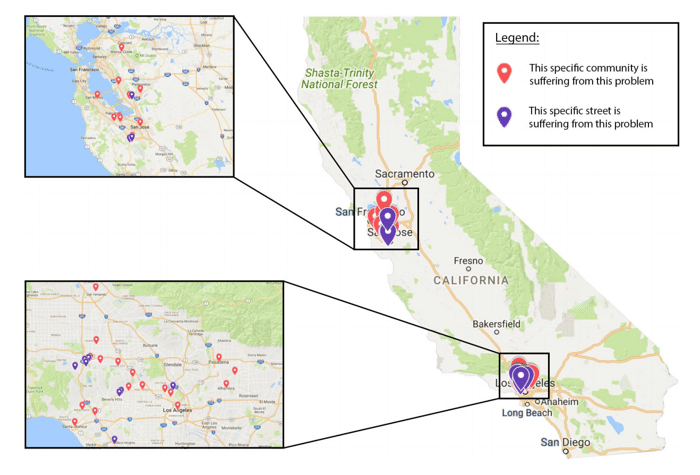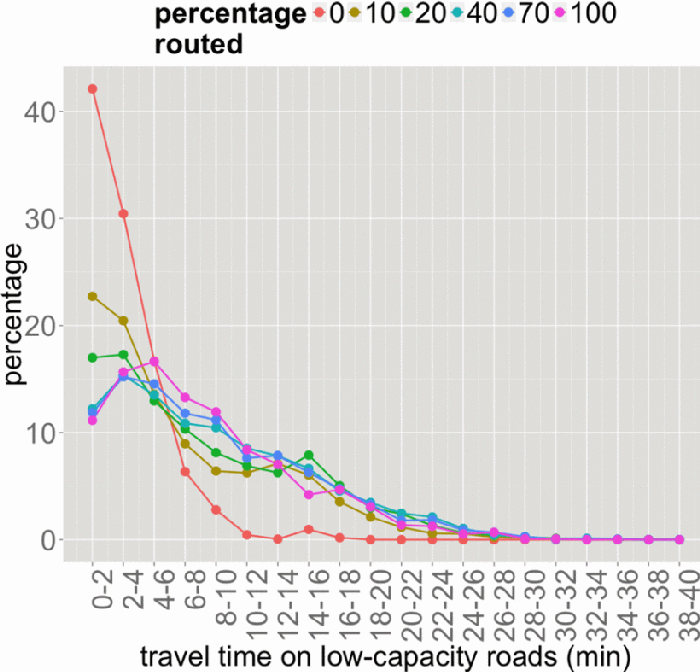Connecting state and local government leaders
Apps like Waze, Google Maps, and Apple Maps may make traffic conditions worse in some areas, new research suggests.
What is the price of anarchy?
Technically, in transportation engineering, the price of anarchy describes the difference between what happens when every driver selfishly picks the fastest route and what the socially optimal traffic outcome would be.
In the pre-mobile-app days, drivers’ selfishness was limited by their knowledge of the road network. In those conditions, both simulation and real-world experience showed that most people stuck to the freeways and arterial roads. Sure, there were always people who knew the crazy, back-road route, but the bulk of people just stuck to the routes that transportation planners had designated as the preferred way to get from A to B.
Now, however, a new information layer is destroying the nudging infrastructure that traffic planners built into cities. Commuters armed with mobile mapping apps, route-following Lyft and Uber drivers, and software-optimized truckers can all act with a more perfect selfishness.
In some happy universe, this would lead to socially optimal outcomes, too. But a new body of research at the University of California’s Institute of Transportation Studies suggests that the reality is far more complicated. In some scenarios, traffic-beating apps might work for an individual, but make congestion worse overall. And autonomous vehicles, touted as an answer to traffic-y streets, could deepen the problem.
“This problem has been vastly overlooked,” Alexandre Bayen, the director of UC Berkeley’s Institute of Transportation Studies, told me. “It is just the beginning of something that is gonna be much worse.”
Bayen and a team of researchers presented their work earlier this year at the Transportation Research Board’s annual meeting and at the Cal Future conference at Berkeley in May 2017. They’ve also published work examining the negative externalities of high levels of automatic routing.
In the Cal Future talk, Bayen walked through a simulation created in the commercial-transportation simulator Aimsun. The video below shows how the flow of a freeway changes in response to an accident under two conditions: when no drivers use routing apps and when only 20 percent of drivers use routing apps. When there are more app-using drivers, congestion builds up at off-ramps, creating more traffic on the freeway.
“The situation then gets much worse because hundreds of people just like you want to go on the side streets, which were never designed to handle the traffic,” Bayen says. “So, now, in addition to congesting the freeway, you’ve also congested the side streets and the intersections.”
While it’s clear that traffic on local roads gets worse with the use of these apps, Bayen said that nobody has managed to do a multi-scale analysis that can determine if the apps, even if they create local problems, are better or worse for whole traffic basins.
Nonetheless, the adoption and use of these apps continues to grow, too, Bayen said. Over the last 10 years, traffic-routing apps have become a standard accessory for the driving public. According to a 2015 Pew survey, 90 percent of Americans with smartphones use maps for driving directions at least some of the time. As smartphone penetration reaches up above 70 percent, a vast number of people now have access to real-time traffic data on their phones. The driving public is better informed about routes and road conditions than ever before.
In many local neighborhoods, residents have complained about increased traffic volumes. Bayen’s team has been gathering stories from around California of resident complaints and found dozens in even a short time window, as shown in the map below.

Bayen’s team showed that their concerns are real. In the chart below from a 2016 presentation, drivers who are routed by mapping applications spend many more minutes on “low-capacity roads,” which is to say side streets.

But the Berkeley research suggests there could be a deeper, broader issue. A few people using route-planning maps makes things better, but a lot of people using them might force a deterioration of driving conditions. It is a very 2018 version of Garrett Hardin’s “tragedy of the commons,” where we, ourselves, are the cattle, the mapping software is the herdsman, and the roads are the common pasture. Nonetheless, the outcome is the same. In transportation-engineering terms, it could be that routing apps increase the price of anarchy.
That said, they have not proven this yet. While it’s clear that these apps can put stress on local side streets, we still don’t know what effect they may have on highways, or for traffic systems as a whole. “This is an open problem,” said Bayen. “Hence, we need to be very cautious in our conclusions.”
They’re building on pioneering work by researchers like Hani Mahmassani into the role of real-time informationin shaping traffic conditions. In 1991, Mahmassani challenged what he took to be “possible misconceptions that information will automatically lead to improvements in traffic conditions.” He was not alone. That same year, other researchers noted that “information can cause drivers to change their departure times in such a way as to exacerbate congestion.”
Nonetheless, most of this early work showed that when the percentage of drivers with access to information was low, there was a major benefit for better-informed drivers. So, in the early days of Waze and Google Maps and automated routing at UPS, many individuals did experience substantial benefits from these applications. The roads, as a whole, were probably also flowing better.
But as more and more users become informed through these apps, this line of research suggests that their benefits for users and nonusers could disappear.
“Google Maps strives to accurately model and reflect the ever-changing real world. Our algorithm takes a number of different factors into account when creating routes, including aggregated and anonymized historical data,” a Google spokesperson told me. “We’re constantly working to improve our algorithm in order to provide users with the best directions on Google Maps.”
Lyft and Uber declined to comment. Apple did not respond to a request for comment.
Bayen does, in fact, have a suggestion for improving these apps, but the companies might not like it. He thinks the apps should spread out drivers on different routes intentionally, which would require collaboration among the mapping apps. Given the cutthroat nature of competition in Silicon Valley, that’s a tough sell, but it might help bring down the price of anarchy.
Alexis Madrigal is a staff writer at The Atlantic, where this article was originally published.

NEXT STORY: Internet for All: Principles for Building Constituent-First Municipal Broadband Networks




